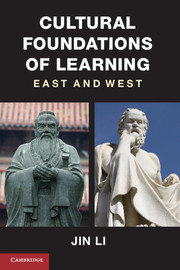Book contents
- Frontmatter
- Contents
- Preface
- 1 Faust and the Birth of a Research Agenda
- 2 Learning to Master the Universe and to Transform Self
- 3 Time Past and Time Present
- 4 Mind-Oriented and Virtue-Oriented Learning Processes
- 5 Curiosity Begets Inquiry and Heart Begets Dedication
- 6 Nerd’s Hell and Nerd’s Haven
- 7 Socratic and Confucian Tutors at Home
- 8 The Devil’s Advocate and the Reluctant Speaker
- 9 Implications for the Changing Landscape of Learning
- Bibliography
- Index
9 - Implications for the Changing Landscape of Learning
Published online by Cambridge University Press: 05 June 2012
- Frontmatter
- Contents
- Preface
- 1 Faust and the Birth of a Research Agenda
- 2 Learning to Master the Universe and to Transform Self
- 3 Time Past and Time Present
- 4 Mind-Oriented and Virtue-Oriented Learning Processes
- 5 Curiosity Begets Inquiry and Heart Begets Dedication
- 6 Nerd’s Hell and Nerd’s Haven
- 7 Socratic and Confucian Tutors at Home
- 8 The Devil’s Advocate and the Reluctant Speaker
- 9 Implications for the Changing Landscape of Learning
- Bibliography
- Index
Summary
As the natural flux of human history proceeds, the current world is always different from the one just passed, no matter how people may define the current world and past worlds. All signs indicate, however, that the very current world is not only as much in flux as any prior world, but the pace of change is unprecedentally fast. Change is taking place on many fronts, affecting virtually every aspect of human life. No doubt, with the advent of science and technology, particularly communication technology, the world is experiencing accelerated and often unpredictable change. The term that is used to capture this large-scale change is globalization. Political change is seen in the democratization of nations, social change in everyday life within nations, economic change in the cross-nation interdependency, scientific/technological change in the explosion of knowledge and digitization of the world, and, pessimistically, environmental change in the direction of destruction. It is not surprising that many find this kind of change disorienting and dizzying. The fragility and ephemeral nature of life are felt more than ever before.
GLOBAL MASSIVE MIGRATION
As a result of all these changes, the world is witnessing massive population migration. Two trends of this migration have been observed in recent decades. First is the within-nation migration owing to economic/social/political development. For example, more than 100 million migrant workers in China have been leaving farming to rush to cities to find work, which is visible in all the new construction that has taken place in China over the past thirty years. These migrant workers surely make better wages than they did tilling the land their ancestors have tilled for millennia. Many not only migrate to nearby cities, but travel afar to seek greater economic reward.The second trend, much more massive, is the cross-nation migration and immigration (the former may not seek to settle down in the new culture but the latter may). The motivation for such massive global migration is driven by the same forces as those within nation.
- Type
- Chapter
- Information
- Cultural Foundations of LearningEast and West, pp. 329 - 352Publisher: Cambridge University PressPrint publication year: 2012



